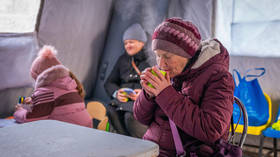Indian woman tortured to death by her Saudi employer - family
A 25-year-old woman from India, working as a housemaid in Saudi Arabia, was tortured to death by her employer, the woman's family claims. However, The Saudi hospital where she had been treated says she died of "natural causes."
Asima Khatoon, from Hyderabad, had managed to sneak a call to her family two months before her death to blow the whistle on her ill treatment at the hands of her employer, Abdul Rahman Ali Mohammed, the ANI news agency reported, citing Asima’s family members.
Asima Khatoon-25 died in Riyadh due to tourcher by her Employer,mother wants her body back @MEAIndia please help pic.twitter.com/0BSZ7jorLd
— Amjed Ullah Khan MBT (@amjedmbt) May 9, 2016
They said the young woman complained of being harassed both physically and mentally, and begged her parents to help her get back to India as soon as possible.
The Telangana state government sent a request to the Ministry of External Affairs asking for help in repatriating the woman, Indian media report.
It was a call from an unknown source that informed relatives in India she had died at the King Saud hospital for chest diseases.
How sad Asima had to die alone in a hospital in #SaudiArabia; the 25-year-old went from #Hyderabad in Dec pic.twitter.com/tfkZrj0Xlt
— Uma Sudhir (@umasudhir) May 9, 2016
Asima went to Riyadh in December 2015 on a business or a tourist visa, according to various reports. The Saudis stopped using ‘house maid’ visas two years ago.
The visa was issued for a period of 90 days. As soon as that ran out, Asima was reportedly kept locked up against her will by her employer.
Need for regulation: Asima sent on 90-day long vacation visa whereas she was put to work as domestic labour pic.twitter.com/srwK5GekSS
— Uma Sudhir (@umasudhir) May 9, 2016
Her sole phone call appears to be the only word anyone had received from the woman since her departure for Saudi Arabia.
The Indian police said they were investigating the case. "She went there for work. She worked there for four months, but thereafter she developed some health issues. We don't have confirmation about the incidents. We have written a letter to the Saudi consulate by secretariat on behalf of the state government," inspector Ramesh told Indian media.
The Indian embassy sent one of its officials to the hospital where Asima had been treated to inquire about her death.
“He [the embassy official] was told by the mortuary in-charge that she was admitted to the hospital on April 27 and later on shifted to the ICU. Her death was due to natural causes and he was informed that all the requisite documents had been handed over to the sponsor for submission to the embassy,” External Affairs Ministry spokesperson Vikas Swarup said as cited by the Hindu.
Asima’s death certificate specifies that she died due to "disseminated TB and multi-organ failure,” the spokesman said.
The Gulf kingdom has long been slammed by human rights organizations for its treatment of foreign domestic workers, largely from Asia and Africa.
“Saudi Arabia's restrictive kafala (visa-sponsorship) system, which ties migrant workers’ legal residency to their employers, grants employers excessive power over workers and facilitates abuse,” a report by Human Rights Watch stated in November.
Asima’s story follows another, that of Kasthury Munirathnam, 50, who in October reportedly had her hand chopped off for asking for the money she was owed, so she could travel back home.
Uganda has recently banned housemaids from traveling to the country for work, after receiving numerous complaints.
A recent British inquiry found that even in the UK the country’s worker scheme for foreigners contributed to the same slave-like conditions perpetrated by Saudis against their maids. This is due to the ‘kafala’ system - a Gulf concept that binds foreign workers to their employer for the duration of their stay in the country. If a woman enters the UK with her Saudi employer, she may not seek other employment and has virtually no recourse to legal protection.













